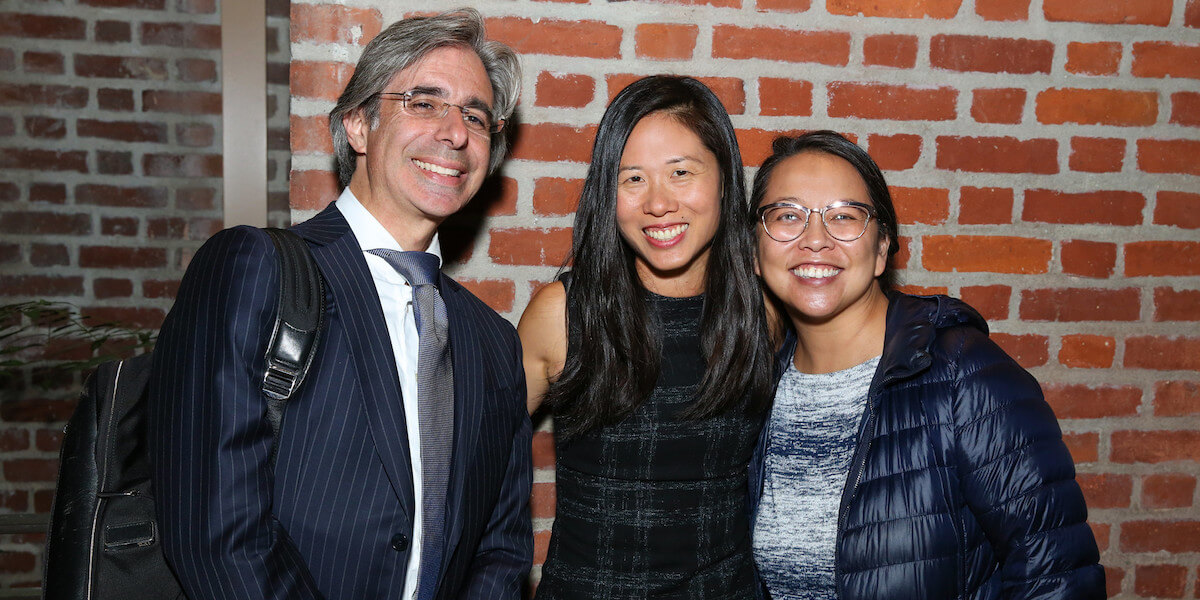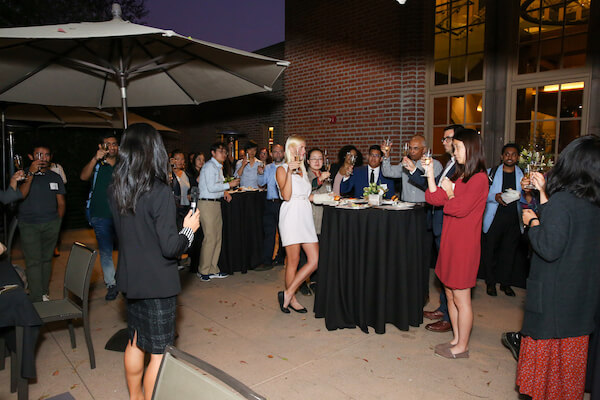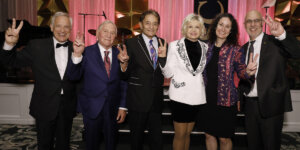
(Left to Right) MEPC Instructor Gianluca Lazzi, MEPC Director Alice Liu, and MEPC Instructor Pai-Ling Yin (Photos/Nicolas Sage)
From watchmakers to airplane manufacturers, companies in a wide-range of industries must hire workers to grind, deburr, sand and polish their products in the final stages of the manufacturing process.
Because such work is dirty and dangerous, though, there exists a dearth of high-skilled employees willing to perform such thankless tasks.
Members of the startup GrayMatter Robotics believe they have found a solution to this longstanding problem.
The USC Viterbi trio – postdoc Ariyan Kabir, Ph.D. ME ’19; Brual Shah, a research associate in AME; and S.K. Gupta, director of the Center for Advanced Manufacturing and Smith International Professor in Mechanical Engineering – hope to leverage AI to create smart and rapidly deployable robotic assistants to automate the finishing process in manufacturing. GrayMatter’s robots would be ideally suited for low-volume work, the type of jobs manufacturers often struggle to fill, Kabir said.
To validate their concept and understand customer needs, the members of GrayMatter Robotics have joined the Maseeh Entrepreneurship Prize Competition, or MEPC. Over the next five months, GrayMatter and 14 other USC Viterbi student-led teams will attend workshops about customer discovery, intellectual property, learn about business models and sharpen their entrepreneurial skills. The National Science Foundation Innovation Corps (“I-Corps”) program, the nationally recognized lean startup program focused on technology commercialization, will provide the curriculum.
“We are good engineers and scientists but lack business skills,” Shah said. “MEPC will help us improve our skills and clarify our thinking before we launch our company ”
On Monday, Nov. 4, the 10th anniversary edition of MEPC held its official kickoff. At the reception, the aspiring entrepreneurs met for the first time with team mentors, who will help them translate their ideas into viable companies. The finals will take place April 2, 2020.
“We think this robust and thriving entrepreneurship competition is the best at USC,” USC Viterbi Dean Yannis Yortsos told the crowd.
Added MEPC director Alice Liu: “The point of MEPC is to spark the entrepreneurial spirit in our engineering student population and to inspire them to take their skills and ideas and turn them into products, solutions and companies.”
At stake in the competition is $100,000 in prize money and legal services offered by DLA Piper and Morrison Foerster.

MEPC participants, mentors, and instructors mix at the competition’s Nov. 4 launch.
The MEPC contest, especially the workshops, will “guide the teams of students through the most important aspects of understanding whether they have a viable business concept, understanding the dynamics of starting a business as well as the financial aspects of the potential business,” said Gianluca Lazzi, – the Fred H. Cole Professor of Engineering; Provost Professor of Ophthalmology, Electrical Engineering, Clinical Entrepreneurship and Biomedical Engineering; and an MEPC workshop leader.
Added Pai-Ling Yin of the Lloyd Greif Center for Entrepreneurial Studies at the USC Marshall School of Business: “We want to train them so that their ventures don’t fail for preventable reasons, such as a lack of product demand or the existence of a better and cheaper competing product.”
This year’s MEPC features a wide array of startups in sectors ranging from education to medical devices to smart manufacturing and 3-D printing.
Machine Analytics seeks to predict machine failures in manufacturing using machine learning and cloud computing. MedMixer hopes to produce a medical device that separates and mixes ingredients for drugs whose components must remain separated until delivery time. Atomus has built a USB device that plugs into any 3-D printer and counts the number of times a 3-D design file is printed, making it easier for companies to license their design files. MIQYAS develops technology-based measurement solutions for fashion retailers to increase their sales channels, increase their conversion rates, and decrease returns.
MEPC, founded in 2010 with a $1 million endowment from entrepreneur Fariborz Maseeh, has become one of the university’s premier business model competitions for USC Viterbi and other students, faculty and other would-be business builders.
Over the past decade, MEPC has launched several promising companies.
The 2019 MEPC winner, AIRBOND, now called Apogee Composites, has designed a more efficient and cheaper way to produce carbon fiber composite materials for the aviation and other industries. This year’s runner-up, Marlink, an all-women undergraduate team developing an underwater exploration device that allows information to be transmitted and received between AUV’s and scientists, recently represented the United States in the Global Grand Challenges Summit finals in London.
Thermal View Monitoring, the 2017 winner, has developed an image guidance system that provides a real-time, 3-D temperature map during thermal ablation therapy. Unlike with MRIs and CTs, physicians could take quality images right in the operating room, saving significant time and money. AesculaTech, the 2016 runner up, develops and manufactures a platform of temperature-responsive smart materials for use in medical devices, including the treatment of dry eye. After MEPC, AesculaTech received an invitation to Y Combinator, the famed Bay Area business incubator.
The 2014 victor, IMBRACE, makes braces that incorporate programmable memory wire technology. Second Spectrum, the 2013 victor, analyzes big data for insights into sport performance, such as what constitutes good defense and offense in basketball. Currently, all NBA teams receive Second Spectrum optical tracking data, which powers next-generation analytics.
Julius Bogdanowicz – a member of USC Viterbi’s Electrical and Computer Engineering Advisory Board, former director of engineering programs at Raytheon, and an MEPC mentor to 2019 winner AIRBOND – said he volunteers his time to help aspiring entrepreneurs avoid the many pitfalls that await them.
“I probably made every mistake you can make in trying to get [my own] ideas off the ground,” said Bogdanowicz, who will mentor Atomus in this year’s contest. “I feel I can help the MEPC students focus on what’s most important in their pursuit and how a potential investor might view it so they don’t get side-tracked and have a better chance of success.”
View an album of the event on Flickr
Published on November 13th, 2019
Last updated on September 19th, 2021











